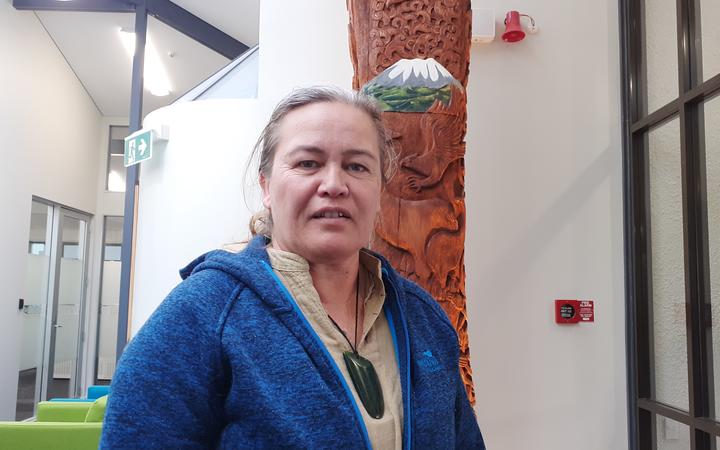A Māori wards advocate says Ruapehu District Council’s refusal to lift its proposal for Māori ward seats from two to three is “another example” of why Māori turn their back on participation in local government.

Taumarunui Māori wards advocate Fiona Kahukura Chase Photo: LDR / Moana Ellis
Ruapehu District councillors voted down a move by its two Māori councillors to boost the number of proposed Māori ward seats following clear messages from marae hui that Māori want at least three seats for the new Māori ward being introduced next year.
The mayor, cheif executive and staff, both Māori councillors and several other councillors attended the “pre-consultation” hui at Raetihi Marae and Mōrero Marae to discuss Māori representation proposals and get a steer on how many Māori seats it should have.
But most councillors voted against a subsequent motion by councillor Elijah Pue and seconded by Viv Hoeta to change its Initial Representation Proposal from two Māori seats. Instead, the council confirmed its proposal for a smaller council comprising six general seats, two Māori seats and a mayor, and opened formal consultation. (Pue and Hoeta were both elected to general seats before the council voted to bring in Māori wards.)
Taumarunui Māori wards advocate Fiona Kahukura Chase says the council has failed to show it listens to Māori.
“If they go out for consultation and they’re truly listening, why don’t they propose what the people want instead of having to go into formal consultation – they’ve already heard from the people.
“I just think they’ve got it wrong. I think they’ve wasted our time, well over a year in trying to motivate them to do better for our community.
“That’s why people don’t engage – because when you do engage you don’t get listened to. They’re seeking Māori participation and engagement: we do that, and it’s not listened to. That’s why people don’t do it. It’s almost pointless. It’s infuriating.
“We actually wanted 50-50, which would be four seats, reflecting the population. This seems like a deliberate move to minimise Māori participation. They are using legislation to drive us down.”
In 2018 Census data, 45.3 percent of people in the Ruapehu District identify as Māori.
Chase was also unimpressed by the council’s suggestion that more Māori should stand for the district’s community boards to increase involvement in local decision making.
Under the council’s Initial Representation Proposal, the number of community boards would double from two to four, each with four elected members and expanded responsibilities focused on operational issues, allowing councillors to focus on governance and strategy.
Chase said involvement at community board level would not replace the need for Māori to be equitably represented at the council table where important decisions were made on behalf of the community.
Ruapehu Mayor Don Cameron said calls from the pre-consultation marae hui were “exactly what we expected” but Māori electoral roll numbers did not support what Māori asked for.
He said it is possible to have three Māori ward seats for next year’s local body elections – but only if roll numbers change or the council is prepared to be challenged for making a decision outside of current rules.
“It absolutely is (possible), but there’s got to be far more Māori on the electoral roll for that to happen. All we’ve done is just made sure that we’re effecting the exact numbers of people on the Māori roll. At the moment that only supports two, not three.
“If we step outside any of the numbers that we’ve got through the electoral roll, we will be challenged straight away, there’s no doubt about that. We believe it isn’t worth going through a challenge by the Local Government Commission at this stage.
“If there is an overwhelming desire for three, we’re quite happy to look at it. All we’re doing is going out with recommendation, that’s all it is.”
Cameron says if changes to the timing and frequency of the Māori Electoral Option are made, allowing Māori to switch from the general roll to the Māori roll, the determining figures could change “quite easily” to allow three seats.
The Initial Representation Proposal is the result of the six-yearly review to determine the council’s representation arrangements. It is now open for submissions before a final decision is made in November.

Local Democracy Reporting is a public interest news service supported by RNZ, the News Publishers’ Association and NZ On Air.